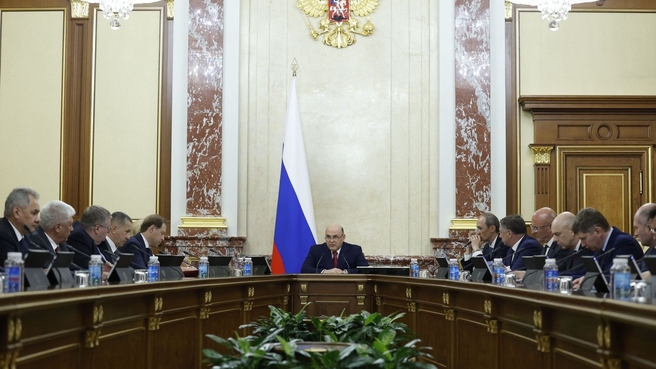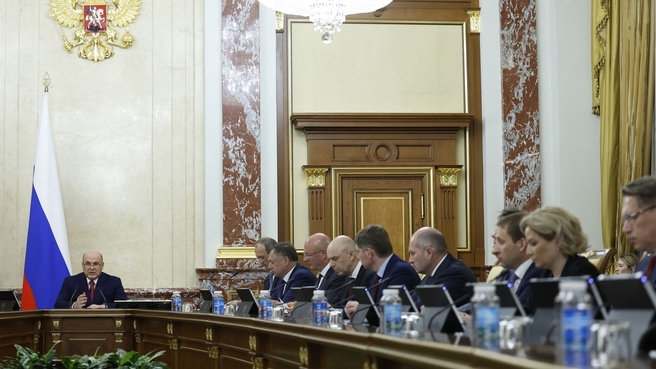The agenda includes the results of the execution of the federal budget and the implementation of state programmes in 2022, support of SMEs in the new regions, the results of a competition for projects to create a comfortable urban environment in the Far East, and the construction of modular hotels in the regions.
Mikhail Mishustin’s opening remarks:
Colleagues, good afternoon,
First of all, I would like to congratulate you on Russia Day, the holiday we celebrated yesterday.
This is an important date for the unity of our people, for all those who appreciate our national history and culture, who are ready to work for the wellbeing of Russia and defend its interests every day.
I am confident that together we will overcome any challenges for the benefit of our people and the development of our nation. Congratulations again.
One of the key tasks for this year set for us by the President was the expansion of foreign economic cooperation with promising partners from friendly states.
Last week, together with our foreign colleagues we held an entire range of important events in Sochi, first of all the Eurasian Intergovernmental Council and the Council of CIS Heads of Government. There were also bilateral meetings. We had a discussion at the 3rd Eurasian Congress. We talked with young people at the 2nd Youth Forum of the CIS and EAEU.
We had a big exhibition. At this exhibition, which was called "Eurasia Is Our Home", we gained an insight into joint projects. They fully reveal our common industrial potential, which we are creating in cooperation with our colleagues from the friendly countries.
I would like to say that our countries are determined to continue working together. This was the opinion of all heads of government. All of our colleagues are ready to develop new areas of cooperation, to achieve technological, economic and financial sovereignty, and, of course, to strengthen our economies and improve the quality of life of our people.
A number of important decisions have been taken. We have established a legal framework for free trade in services and increased investment in the Commonwealth of Independent States. We signed an agreement that took 12 years to prepare. It creates additional incentives for attracting capital and new jobs, because trade in services is now becoming a new driver of economic growth.
As for the Eurasian Economic Union, all our partners are seriously interested in further deepening integration.
And together we will continue to take measures to develop our cooperation and to implement promising initiatives. The most interesting opportunities are in technological and financial independence, the digital sphere, optimising transport and supply chains, climate regulation, and a range of other areas. We will do everything necessary for free movement of goods, services, capital and labour.
The adoption of the Agreement on Mutual Recognition of Academic Degrees in All of the [Eurasian] Five was an important step. A degree holder will be able to work within the union without going through unnecessary bureaucratic procedures. This creates excellent conditions for the exchange of qualified personnel between all five countries.
Colleagues, we appreciate the good relations that bind Russia with our Eurasian neighbours, with all friendly countries. We must support them in every way possible. And together, I am confident, we will cope with all the arising challenges.
The ideas and proposals expressed at the Sochi events should be carefully studied and taken into account in our work, and agreements should be implemented. I ask you to keep track of that in your areas of responsibility. This applies to the Deputy Prime Ministers and the heads of federal executive agencies.
Now let us move on to today’s agenda.
Today we will review last year’s federal budget spending.
Despite the fact that the external restrictions were quite severe, we achieved all the planned objectives. First and foremost, we focused our resources on supporting people and businesses, and on unconditionally fulfilling all the social obligations the President is always talking about.
The country's main financial document has maintained a balance, and many of its indicators have improved. Revenues increased by 10 percent to around 28 trillion roubles. At the same time, the share of non-oil and gas sales remained quite high – about 60 percent. And in absolute terms, it exceeded 16.2 trillion roubles.
Expenditures also increased by almost 6 trillion. This money was primarily used to help people. On the instructions of the President, we distributed payment benefits to families with children, indexed pensions, supported the labour market and business. Businesses received preferential loans, and insurance premium deferrals. The construction of hospitals, schools and roads has been accelerated, and housing and communal facilities have been upgraded and modernised.
Separately, I would like to note that the amount of external debt decreased by almost 10 percent.
On the whole, the results of last year's federal budget implementation are not bad.
It is important to maintain this momentum this year. And to improve execution discipline, so that the deadlines for funding all activities are strictly observed.
The next item on the agenda is the implementation of 49 state programmes last year.
Priorities defining the goals of state policy in specific areas were approved for every programme.
The average estimate of all the programmes’ effectiveness exceeded 95 percent, almost 2.5 percent more than in the previous period.
A third of all programmes were carried out practically in full, and in very diverse areas. They include the development of rural areas, the agricultural sector, tourism, education, culture, management of state finances, efforts to facilitate employment and the innovation economy. The state also supported people, businesses and the economy in general in a number of other areas. Importantly, the majority of indicators matched or exceeded the planned objectives.
A large sum of over 19 trillion roubles was allocated for implementing the measures that were also linked with the President’s national development goals. The fulfilment level on these is also very high: 99.2 percent.
It is important that we don’t relax our pace and continue to steadily pursue the goals in the state programmes. The authorities continued the comprehensive development of territories, including rural and remote lands, to allow people to receive new or well-repaired social infrastructure facilities and improve their living standards. As you know, the State Duma deputies always talk to Government members about this.
Let us turn to expanding our support for small and medium businesses.
Today, we will adopt a resolution to send one billion roubles from the budget to organise the My Business centres in the new regions. Anyone will be able to go to such a centre to receive a package of services – from setting up a business to receiving aid to develop it.
The authorities will also establish state financial organisations and will guarantee funds that can provide businesspeople with additional credit.
All services and measures will be accessible in the electronic format as well as on the MSP.RF website. We hope the adopted decision will ensure the systemic integration of the new regions into Russia’s integral socio-economic space, as the President said, and will certainly help people that want to develop their own business.
Now, let us discuss a different subject.
The Government continues helping the Far East regions improve their cities and towns.
This year, the competition for projects on creating a comfortable urban environment was held separately for them in line with the President’s instructions. Cities with a population of up to 250,000 people and towns with more than 5,000 people were invited to take part in it.
The competition was won by 32 municipalities in the Far East. Today, we will allocate over three billion roubles to them for implementing their ideas on improving parks, squares, embankments and other public spaces. People will be happy to live, work and rest in these areas.
It is important to do everything necessary to enhance the quality of life in these Russian regions by creating a comfortable and safe environment there, as the President said.
There is also the issue of developing tourism.
Support for this industry is also important for the regions and many adjacent branches, because it makes it possible to increase the number of new jobs by several times.
On the President’s instruction, the Government is allocating funds to allow investors to create quicker additional accommodation for travelers.
We continue subsidising new modular non-capital structures. It is possible for people to use them all the year, and construction is proceeding much faster, which allows small and medium businesses to recoup their costs quicker.
Last year, 174 projects from 20 regions received funding for these facilities. We earmarked over 4 billion roubles for implementation, which resulted in about 2,500 more rooms for travellers.
This measure was much in demand, and now investors from 79 regions have submitted 1,300 more projects to the competition.
Mr Chernyshenko reported to me on this. There was a boom in the good sense of this word. Today, we will distribute subsidies for 38 regions – over 3.5 billion roubles for these purposes this year and more than 4 billion roubles next year.
In addition to popular places like Altai, and the Kaliningrad and Irkutsk regions, the Government will provide funding for the Chelyabinsk Region, Karachayevo-Circassia and Kabardino-Balkaria, to name a few.
We hope these measures will allow us to improve the quality of hotel rooms and increase the number of them in a reasonably short time, and, hence offer our people more comfortable conditions for travel in Russia. Mr Chenyshenko, I would also like to ask you, and the Finance Ministry, to think about additional sources for the continued support of these projects.










